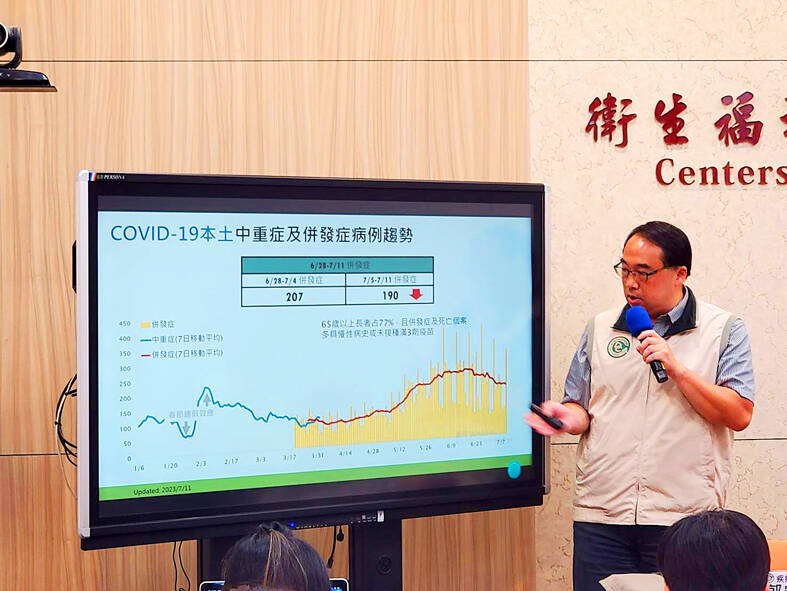Domestic COVID-19 and seasonal flu outbreaks are slowing down, but they were still 25 severe flu-related complications and eight deaths confirmed last week, the Centers for Disease Control (CDC) said yesterday, as it urged people to watch for signs of severe complications.
CDC Epidemic Intelligence Center Director Guo Hung-wei (郭宏偉) said the average number of people hospitalized with COVID-19 was 190 per day last week, lower than the daily average of 207 cases the previous week.
The testing positivity rate fell from 2 percent in the previous week to 1.6 percent last week, and the number of prescribed oral anti-viral drugs also continued to decline, he said.

Photo: Lin Hui-chin, Taipei Times
CDC Deputy Director-General and spokesperson Tseng Shu-hui (曾淑慧) said based on the trend of weekly hospitalized cases, positivity rates, oral anti-viral prescriptions and total hospital visits, the CDC’s analysis is that the domestic COVID-19 situation is no longer at a plateau and new cases are expected to continue declining for the next two to three months.
Weekly genomic surveillance data showed that 87 percent of the sequenced local infections in the past four weeks were caused by the Omicron XBB subvariant and 13 percent by the Omicron BA.2.75 subvariant, Gou said.
Meanwhile, there were 68,795 hospital visits for flu-like symptoms last week as case numbers continued to decline, he said.
The two dominant flu virus strains circulating locally are influenza A (H1N1) and influenza A (H3N2), he added.
However, 25 severe flu complications and eight flu-related deaths were confirmed last week, Gou said, adding that an accumulated 374 severe cases, including 76 deaths, have been confirmed since the beginning of October last year.
CDC physician Lin Yung-ching (林詠青) said of the eight people who died, six were unvaccinated and six had underlying health conditions.
They died of pneumonia, respiratory failure, septic shock or multiple organ failure about eight to 10 days after the onset of symptoms, Lin said.
People with a higher risk of developing severe illness from infection should especially watch for signs of severe complications, including difficulty breathing, shortness of breath and cyanosis (the skin, lips or nails turning blue due to a lack of oxygen in the blood), and seek immediate medical attention if they occur, he said.
In addition, although enterovirus infection is no longer in the epidemic period, a severe case was confirmed last week, Tseng said, adding that 11 new local cases of mpox were also confirmed last week.
Lin said that the severe case of enterovirus infection was a five-month-old boy in central Taiwan, who was hospitalized last month after experiencing a sore throat, mouth blisters and difficulty swallowing.
He was discharged from hospital after five days, but on the third day after returning home he developed a fever and mouth ulcers, and pain and weakness in his left leg, Lin said.
The boy was hospitalized again and found to have acute transverse myelitis (a rare neurological condition caused by inflammation of the spinal cord), and was confirmed to be infected with coxsackievirus A4, he said, adding that he was discharged from hospital after another 10 days.

WANG RELEASED: A police investigation showed that an organized crime group allegedly taught their clients how to pretend to be sick during medical exams Actor Darren Wang (王大陸) and 11 others were released on bail yesterday, after being questioned for allegedly dodging compulsory military service or forging documents to help others avoid serving. Wang, 33, was catapulted into stardom for his role in the coming-of-age film Our Times (我的少女時代). Lately, he has been focusing on developing his entertainment career in China. The New Taipei District Prosecutors’ Office last month began investigating an organized crime group that is allegedly helping men dodge compulsory military service using falsified documents. Police in New Taipei City Yonghe Precinct at the end of last month arrested the main suspect,

A cat named Mikan (蜜柑) has brought in revenue of more than NT$10 million (US$305,390) for the Kaohsiung MRT last year. Mikan, born on April 4, 2020, was a stray cat before being adopted by personnel of Kaohsiung MRT’s Ciaotou Sugar Refinery Station. Mikan was named after a Japanese term for mandarin orange due to his color and because he looks like an orange when curled up. He was named “station master” of Ciaotou Sugar Refinery Station in September 2020, and has since become famous. With Kaohsiung MRT’s branding, along with the release of a set of cultural and creative products, station master Mikan

LITTORAL REGIMENTS: The US Marine Corps is transitioning to an ‘island hopping’ strategy to counterattack Beijing’s area denial strategy The US Marine Corps (USMC) has introduced new anti-drone systems to bolster air defense in the Pacific island chain amid growing Chinese military influence in the region, The Telegraph reported on Sunday. The new Marine Air Defense Integrated System (MADIS) Mk 1 is being developed to counter “the growing menace of unmanned aerial systems,” it cited the Marine Corps as saying. China has constructed a powerful defense mechanism in the Pacific Ocean west of the first island chain by deploying weapons such as rockets, submarines and anti-ship missiles — which is part of its anti-access/area denial (A2/AD) strategy against adversaries — the

RISING TOURISM: A survey showed that tourist visits increased by 35 percent last year, while newly created attractions contributed almost half of the growth Changhua County’s Lukang Old Street (鹿港老街) and its surrounding historical area clinched first place among Taiwan’s most successful tourist attractions last year, while no location in eastern Taiwan achieved a spot in the top 20 list, the Tourism Administration said. The listing was created by the Tourism Administration’s Forward-looking Tourism Policy Research office. Last year, the Lukang Old Street and its surrounding area had 17.3 million visitors, more than the 16 million visitors for the Wenhua Road Night Market (文化路夜市) in Chiayi City and 14.5 million visitors at Tainan’s Anping (安平) historical area, it said. The Taipei 101 skyscraper and its environs —